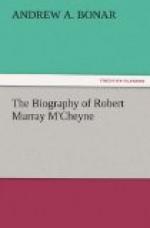He continues his diary, though often considerable intervals occur in the register of his spiritual state.
“May 9.—How kindly has God thwarted me in every instance where I sought to en lave myself! I will learn at least to glory in disappointments.”
“May 10.—At the Communion. Felt less use for the minister than ever. Let the Master of the feast alone speak to my heart.” He felt at such times, as many of the Lord’s people have always done, that it is not the addresses of the ministers in serving the table, but the Supper itself, that ought to “satiate their souls with fatness.”
May 21.—It is affecting to us to read the following entry:—“This day I attained my twenty-first year. Oh! how long and how worthlessly I have lived, Thou only knowest. Neff died in his thirty-first year; when shall I?"[3]
[3] It is worthy of notice how often the Lord has done much work by a few years of holy labor. In our Church, G. Gillespie and J. Durham died at thirty-six; Hugh Binning at twenty-six; Andrew Gray when scarcely at twenty-two. Of our witnesses, Patrick Hamilton was cut off at twenty-four, and Hugh M’Kail at twenty-six. In other churches we might mention many, such as John Janeway at twenty-three, David Brainerd at thirty, and Henry Martyn at thirty-two. Theirs was a short life, filled up with usefulness, and crowned with glory. Oh to be as they!
May 29.—He this day wrote very faithfully, yet very kindly, to one who seemed to him not a believer, and who nevertheless appropriated to herself the promises of God. “If you are wholly unassured of your being a believer, is it not a contradiction in terms to say, that you are sure the believers’ promises belong to you? Are you an assured believer? If so, rejoice in your heirship; and yet rejoice with trembling; for that is the very character of God’s heirs. But are you unassured—nay, wholly unassured? then what mad presumption to say to your soul, that these promises, being in the Bible, must belong indiscriminately to all! It is too gross a contradiction for you to compass, except in word.” He then shows that Christ’s free offer must be accepted by the sinner, and so the promises become his. “This sinner complies with the call or offer, ‘Come unto me;’ and thereafter, but not before, can claim the annexed promise as his: ’I will give thee rest.’”




